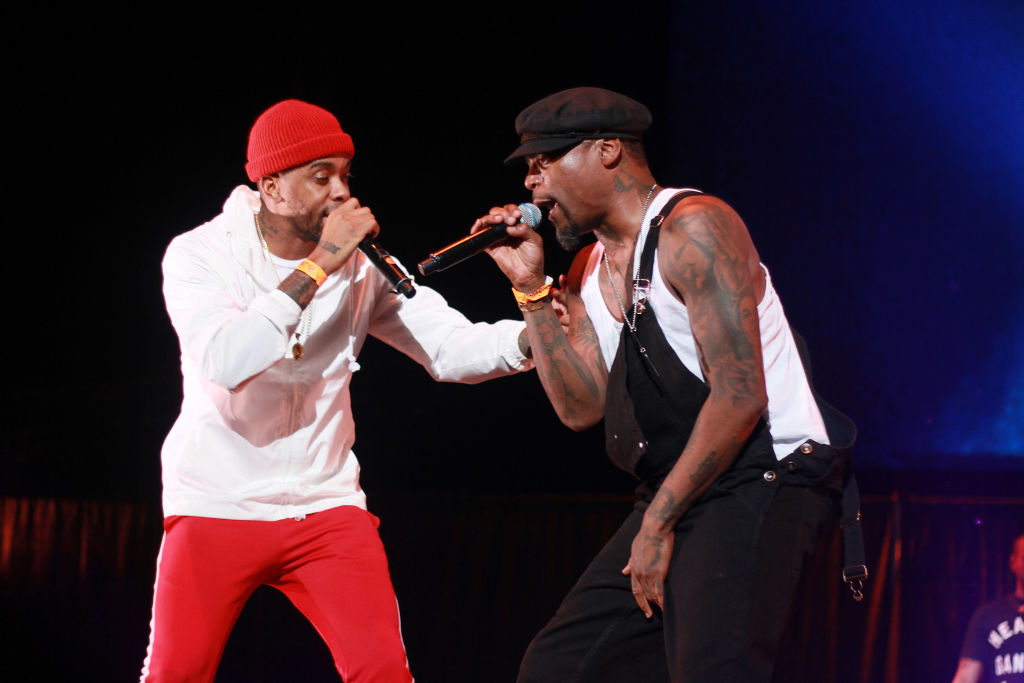Source: Gladys Vega / Getty
This year marks the twenty-fifth anniversary of Let’s Get Free, the highly celebrated debut album of Hip-Hop duo dead prez. Consisting of Stic (Khnum Ibomu) and M-1 (Mutulu Olugbala), dead prez burst onto the scene with politically conscious music that thoroughly engaged Hip-Hop fans in a parallei to the rap artists whose focus on luxury and materialism contributed to the rise of “the Bling Era.”
The album, fueled by the electric single “Hip-Hop,” would touch upon multiple issues affecting Black and Brown communities globally, with lyrics that still carry resonance and relevancy years later.
On Friday (March 28), dead prez will be the focal point of a special edition of BRIC Studios’ Stoop Share series at their venue in Brooklyn, New York. “Music, Message and Movement: Liner Notes for Liberation” is the theme of the evening co-produced by the group along with Jill Newman Productions, which will begin with a community conversation with dead prez on the legacy of Let’s Get Free and their perspective on revolutionary message music, followed by a special ticketed concert performance. Ahead of the highly anticipated evening, HipHopWired had a chance to talk about the impact of their debut album with dead prez as well as their views on the pressing need for art that will inspire the people in these times.
This interview has been edited for length and clarity.
HipHopWired: The impact of Let’s Get Free, it’s undeniable, and everything within it still rings true, 25 years later. With this anniversary, how have fans and others who’ve listened to the album and your music entirely shared how it’s impacted their lives?
M-1: Man, I gotta say…one great thing that that I hear with this piece of art that myself and Stic along with the help of a community of people from Tallahassee to Brooklyn, elders and ancestors. One great thing that I hear people say was that it changed the way that they view their health. I mean, amongst a lot of things that people can attach themselves to, probably one of the most is that we’ve been able to raise the general conversation around staying on this earth a little longer. So I gotta say, I’m pretty proud of just hearing that from time to time.
“It wasn’t for no other reason that we did our record than to have an impact, to have somebody say this matters, and this has helped in some kind of meaningful, actionable way.”—stic
Stic: Yeah, man, you know the term impact is something that I’ve been really enamored with. I was building with my girl the other day about her mom. She does a lot of work in Kenya around advocating for blind youth and education, right? But the thing I want to point out about impact is sometimes, we in society, we do things for the recognition of things. We do things for glory of things, the fame, the “I did this first,” “We did it better”—you see that sentiment. But when your focus is impact, you’re centered on things that might not necessarily get recognized in a public way. You might not get no Grammy. You might not get no whatever, nobody knows your name and all your gossip. But if you focus on impact, it’s those little moments that matter the most to somebody that’s actually doing the work for that purpose.
Like the old saying, where they say, “Give a man a fish he’ll eat for a day. Teach him how to fish and he’ll eat for his life.” That right? There is impact, right? The difference is, you’re actually trying to have something that has a lasting effect, so, bigger than dead prez. I just want to say that even it being a conversation around impact, means that we hit our target. Because it wasn’t for no other reason that we did our record than to have an impact, to have somebody say this matters, and this has helped in some kind of meaningful, actionable way like [M-1] said. Or if it was just a person’s perspective on a struggle that if they found more meaning in it, or if it was another artist that said, “Yo, I could speak to certain issues too. I ain’t gotta just be shucking and jiving out here.” You know what I mean? And in whatever ways that music like ours can really impact, I don’t mean like getting a Grammy for it, but in the everyday person’s life..to us, that is success.
HHW: Seeing the events of the last year unfolding within Hip-Hop culture, with some of the public having more of an appetite for what’s substantial—how optimistic are you that such a shift like that can spur more artists and more demand from the public to engage with art that matters to them like that within Hip-Hop?
Stic: All our chips are in that basket. We’re invested in that being the case, not waiting on it or hoping, but actually putting in the work to be the change we want to see. I mean, it’s more potential than ever. The playing field has been leveled in terms of creative ability to speak direct to each other, right? So I think on that note, the weapons, so to speak, are in our hands now, the people got the weapons. Now it’s about learning how to use the weapon for our best interest. Because Hip-Hop is everywhere. You can’t look at your shadow without seeing somebody’s album, you know what I’m saying? [laughs]
But it’s like…when will we use the technology and the craftsmanship to speak to issues in a way, again, that’s impactful, but also is forward. Not just nostalgic or trying to do what we used to do and say what we used to say for nostalgia’s sake, but continually making it relevant in a contemporary way to push culture forward. Ultimately, we just want to be free and well and and safe and secure in our lives. That’s what people want all around the planet and the small role that art can play in that is huge because it’s from where our inspiration comes and goes, You know what? It’s not all about the artists. Like Public Enemy said, “It takes a nation of millions,” but the artists play a key role, because we articulate what that future could look like.
M-1: I want to add on to what Stic said, and talk about the beckoning of what it means to have an art that is full of change…like they say “repression breeds resistance.”. And you know that seemed like it would be the case, especially in the political climate of today. Where it’s not even right-leaning, extremism kind of runs government, especially from a Republican standpoint in control of the House and Congress. The theory of the minded people who would be leadership in this country, that’s as repressive as it gets. I think the blowback, I’m ready for it. I’m looking forward to it, because it was the kind of thing that like Stic said, this is the basket that we’ve definitely put our eggs in and the way we want our cards to be played.
However, I gotta say, when it comes down to message music or revolutionary music even with certain genres, you’ll find people who say, “Oh, reggae music, these artists need to be supported more. You know they don’t get what they deserve.” Or you even might hear that about Afrobeat. The thing is that I don’t hear it as much about, what I’m urging people to support is message music. It’s in that where you’re going to find truth being told, what’s not usually told, and the sacrifice being made of artists who might not be able to see some of the same stages.
Because we do take a stance against Israel bombing Palestine and killing 400 babies a night. You know what I’m saying? I’m kind of against that, and that might not get me on the same stage. And so, there is a special support that’s needed and necessary, and it’s time for that. It’s a crazy time to be living, knowing that as much as it’s needed, as much as you know they—the proverbial they—are doing to rip everything they can away from those legs, making sure that it doesn’t exist with any power to stand or say anything or any truths could and would be taken away or read or ingested in any way. So anyway, I just got to say on the converse of that, that’s kind of what we’re living in right now. So we need change today, at this very moment.
HHW: With the event that’s happening at BRIC Studios that you guys are putting on with Jill Newman productions being held in Brooklyn…
M-1: Home! That’s the crib.
HHW: Brooklyn has changed dramatically on so many levels. With that said, can this be, or will it be something that will be a continual series in the next step of artivism?
Stic: Right on! I like that term. We have a new audio book that we’re going to be releasing soon, dead prez: Music, Message, Movement: Liner Notes For Liberation. it’s a beautiful piece of collaboration work between myself and M-1 where we’re framing what art and activism is, what that looks like from our point of view, our inspirations, the history of it, the present of it, the future of it. Some of the talk that we’re going to be doing at the BRIC, we’re going to tap into that. And then we’ve also been working—for a couple years now —we’ve been working on a new dead prez album with our team, and so we’re looking to get that finalized and out in the world. Many more things, including workshops and like we’re doing in BRIC around the same “music, message, movement” theme this year for our 25th anniversary.
M-1: I gotta tell you—I can tell Stic too, because he didn’t know—so I woke up this morning to a phone call from from my brother, Fela Kuti’s son, Seun Kuti. Seun hits me this morning. He’s like, “My brother. I hear you are celebrating the greatest liberation album of Africa. Let’s Get Free. 25 years in Brooklyn.” I’m like, “Yooo Seun!” I haven’t spoken to him in a minute, we good. You know, the wives are friends. It’s good. “Where you at?” He says, “My brother, I am in New York, and I will be there for your show.” I hope I got his accent right. [laughs]
It just made me say, “It’s going to be a good night at BRIC. It’s going to be definitely home for a lot of people who are like-minded around what Let’s Get Free has meant. Like you said, it’s gonna be precluded by a conversation that will be moderated by Umi and between us that will discuss some of the new things we have in our new book. But I just look forward to family kind of finding each other again in Brooklyn, and again, the heart of it has changed, but we, the heartbeat is still the same. And we’re going to be there to make it do what it do. So it’s going to be a good time.




